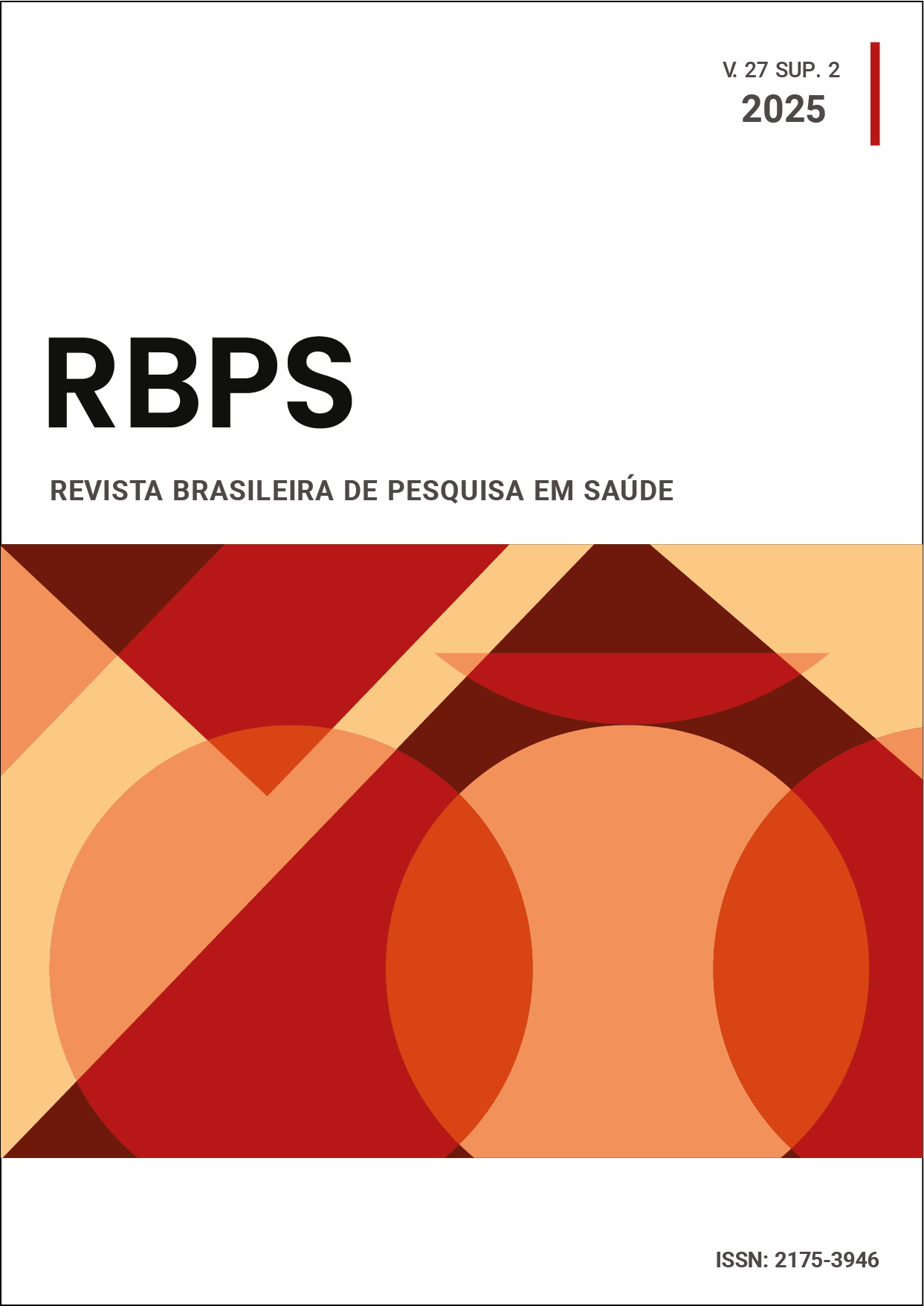Incidence and characterization of physical violence against women aged 20 to 59 in Brazil and its regions in 2022
DOI:
https://doi.org/10.47456/rbps.v27isupl_2.48406Keywords:
Violence against women, Gender-based violence, Domestic violence, EpidemiologyAbstract
Introduction: Understanding the updated epidemiological situation of reported cases and the profile of violence against women—particularly physical violence, one of the most frequent forms, often indicative of other types of violence—is essential for surveillance and for the development of intersectoral public policies focused on prevention and health promotion. Objective: To describe the reported cases of physical violence against women aged 20 to 59 years in Brazil in 2022. Methodology: Ecological study using data from the Information System for Notifiable Diseases, referring to reports of interpersonal violence against adult women in Brazil. Results: In 2022, 179,594 episodes of interpersonal violence against individuals aged 20 to 59 years were reported in Brazil, 75.76% (95% CI: 75.66–75.86) of which involved women. Of these, 75.07% (95% CI: 74.84–75.30) were cases of physical violence. The incidence of physical violence was 16.32 reported cases per 10,000 women in this age group. Most victims were young, Black or Brown, experienced recurrent episodes in the domestic environment, had or had had an affective relationship with the aggressor, and frequently suffered concurrent psychological violence. Conclusion: Despite underreporting, domestic violence against women in Brazil remains alarming. Addressing this issue requires more representative and comprehensive research, as well as more effective measures to protect and provide integral support to victims.
Downloads
References
Krug EG, Mercy VER, Dahlberg LL, Zwi AB. The world report on violence and health. Lancet. 2002 Oct 5;360(9339):1083–8. doi: 10.1016/S0140-6736(02)11133-0.
World Health Organization. Preventing suicide: a global imperative [Internet]. Luxembourg: WHO; 2014 [citado 2024 set 1–2025 jan 31]. Disponível em: https://www.who.int/mental_health/suicide-prevention/world_report_2014/en/
Correia CM, Andrade ICS, Gomes NP, Rodrigues GRDS, Cunha KSD, Diniz NMF. Psychosocial care for people with suicidal behavior from the perspective of users and health professionals. Rev Esc Enferm USP. 2020 Dec 7;54:e03643.
Bahia CA, Avanci JQ, Pinto LW, Minayo MCS. Notificações e internações por lesão autoprovocada em adolescentes no Brasil, 2007–2016. Epidemiol Serv Saude [Internet]. 2020 [citado 2024 set 1–2025 jan 31];29(2):e2020046. Disponível em: http://doi.org/10.5123/S1679-49742020000200006
Guimarães RM, Moreira MR, Costa NR, organizadores. Adolescência e suicídio: um problema de saúde pública. Rio de Janeiro: Fiocruz, SUS; 2024.
Mir TGD. Características das tentativas de suicídio notificadas em Santa Catarina entre 2015 e 2022 [dissertação]. Florianópolis: Universidade Federal de Santa Catarina; 2024.
Penso MA, Sena DPA. A desesperança do jovem e o suicídio como solução. Soc Estado [Internet]. 2020 [citado 2024 set 1–2025 jan 31];35(1):61–81. Disponível em: https://doi.org/10.1590/s0102-6992-202035010004
Gonçalves B. Sobre o desespero. In: Angerami AA, organizador. Sobre o suicídio: a psicoterapia diante da autodestruição. Belo Horizonte: Artesã; 2018 [citado 2024 set 1–2025 jan 31]. Disponível em: https://www.scielo.br/j/se/a/rLfXhwgd7qgpBzMSrjwFXmj/
Faro A, Santos JCS. Suicídio na adolescência: panorama, cuidados e escuta. In: Angerami AA, organizador. Sobre o suicídio: a psicoterapia diante da autodestruição. Belo Horizonte: Artesã; 2018. p. 169–89 [citado 2024 set 1–2025 jan 31]. Disponível em: https://www.scielo.br/j/se/a/rLfXhwgd7qgpBzMSrjwFXmj/
Oliveira VC. Os sentidos da saúde nas mídias jornalísticas impressas. Rev Eletron Comun Inf Inov Saude [Internet]. 2013 [citado 2024 set 1–2025 jan 31];6(4). Disponível em: https://doi.org/10.3395/reciis.v6i4.622
Beck U. A reinvenção da política: rumo a uma teoria da modernização reflexiva. In: Beck U, Giddens A, Lash S. Modernização reflexiva: política e estética na ordem social moderna. São Paulo: Editora Unesp; 1997. p. 11–68.
Braga VEBJG. No descompasso do jornalismo: o deslocamento da objetividade nas reportagens de Ernesto Varela [dissertação]. Belo Horizonte: Universidade Federal de Minas Gerais; 2007.
Bardin L. Análise de conteúdo. Lisboa: Edições 70; 2009.
Silva JR, Assis SM. Grupo focal e análise de conteúdo como estratégia metodológica clínico-qualitativa em pesquisas nos distúrbios do desenvolvimento. Cad Pós-Grad Disturb Desenvolv [Internet]. 2010 [citado 2024 set 1–2025 jan 31];10(1):146–52. Disponível em: https://editorarevistas.mackenzie.br/index.php/cpgdd/article/view/11203
Minayo MCS. O desafio do conhecimento: pesquisa qualitativa em saúde. 9. ed. rev. e amp. São Paulo: Hucitec; 2006. 406 p.
Downloads
Published
Issue
Section
License
Copyright (c) 2025 Brazilian Journal of Health Research

This work is licensed under a Creative Commons Attribution-NonCommercial-NoDerivatives 4.0 International License.
Authors and reviewers must disclose any financial, professional, or personal conflicts of interest that could influence the results or interpretations of the work. This information will be treated confidentially and disclosed only as necessary to ensure transparency and impartiality in the publication process.
Copyright
RBPS adheres to the CC-BY-NC 4.0 license, meaning authors retain copyright of their work submitted to the journal.
- Originality Declaration: Authors must declare that their submission is original, has not been previously published, and is not under review elsewhere.
- Publication Rights: Upon submission, authors grant RBPS the exclusive right of first publication, subject to peer review.
- Additional Agreements: Authors may enter into non-exclusive agreements for the distribution of the RBPS-published version (e.g., in institutional repositories or as book chapters), provided the original authorship and publication by RBPS are acknowledged.
Authors are encouraged to share their work online (e.g., institutional repositories or personal websites) after initial publication in RBPS, with appropriate citation of authorship and original publication.
Under the CC-BY-NC 4.0 license, readers have the rights to:
- Share: Copy and redistribute the material in any medium or format.
- Adapt: Remix, transform, and build upon the material.
These rights cannot be revoked, provided the following terms are met:
- Attribution: Proper credit must be given, a link to the license provided, and any changes clearly indicated.
- Non-Commercial: The material cannot be used for commercial purposes.
- No Additional Restrictions: No legal or technological measures may be applied to restrict others from doing anything the license permits.

























